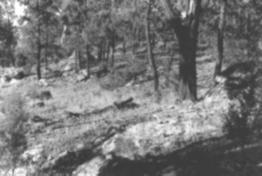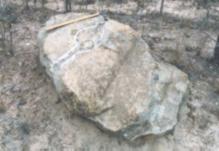Pyramids In The Pacific

The Unwritten History Of Australia
Chapter 10
|
The Lost City of Hypanos
|
He Putteth his hand upon the rock;
He overturneth the mountains by the roots.
Job 28: 9
|
Chapter
10 Images
|

|
Temple of Tanith
Found by Rex Gilroy
Made rich from her conquests abroad, Egypt grew great from the vast amounts of gold, silver, copper and other precious metals, gathered from her mining colonies scattered throughout the ancient world. Her supremacy in gold could not have been maintained had she relied upon her gold mines of Upper Nubia, which were played out by the end of the 2nd dynasty {around 2780 BC}.
Although much gold was obtained via the African 'Punt' of Somalia, and her Mediterranean contacts, there is evidence the Egyptians turned to Asia for increasing supplies of this most precious of metals. As we have seen, the Phoenicians were largely employed in the navigation of Phoenician treasure seeking fleets voyaging in the Indian Ocean. Yet the Phoenicians also undertook their own secret expeditions, so that today, due to their secrecy as to where thier own mining sites were located, the full extent of thier maritime activities remains a mystery. Bronze Age Greek mythology speaks of the Titans, depicting them as rather absurd demi-gods.
Yet the Titans were in reality dynasties of the sea-kings who were continually at war with one another for the control of both the Mediterranean and Atlantic trade, if not all the seas and oceans of the world. Long centuries before the Spanish conquests, they competed for the vast treasures of the America's; and, as this book argues, for the even greater wealth of Australasia and the West Pacific. Isolated far from thier homelands, though still linked by the "great river of ocean" to their monarchs, individual local rulers would nevertheless arise in the major colonies to the position of local God-King status, supported by their own troops, with large work forces at their command, through which they were able to gather considerable personal wealth.
The Titans, or God-Kings of the near and Middle east/ Mediterranean region throughout the Bronze and approaching Iron Age, were men {and sometimes women!} who enjoyed great wealth and power, and were individuals of considerable intellect, trained from childhood for their future as Kings and Pharaohs and possessing the best education of their times. They would have been familiar with traditions of rich rich lands located far beyond the Mediterranean and were adventurous enough to dispatch fleets of ships in the Atlantic and Indian Oceans laden with explorers, their families and supplies, hopeful that their investment would bring great wealth.
Such expeditions would not have been possible without a mastering of ancient technology, such as the building of large vessels, better seamanship, geography, mathematics and astronomy, which beginning in the Copper Age reached a high state of development as the Bronze Age wore on. Parallel with these developments was an advanced agriculture science. The wealth accumulated by these powerful rulers from these expeditions created a leisure class, which also included the merchants whose privately-funded expeditions bought them immense wealth, while the situation of the ordinary people remained much the same as it is today.
To the Titans, the sun was the symbol of the Supreme being, because it provided the daylight required for their trade endeavours, on land and sea. Some historians suggest that the single eye of Cyclops was symbolic of the Sun-disk, which was traditionally branded on the forehead of the Greek bronze smith{ in order to ensure bronze and other important metal trade secrets did not leave the country}. Greek legend states that the Cyclops forged lightning for Zeus. The Greek word for lightning is 'brontes'. Thus when Zeus hurled his lightning he actually hurled his bronze. On Mount Olympus, Hephaestus {or Vulcan}, the blacksmith of the Gods, laboured at his forge in a bronze-lined workshop.
Similarly, these Greek myths had their variations in other Bronze Age lands; and the later Germanic counterpart, the god-like hero Siegfried, forged the shattered fragments of his father's sword into an invincible weapon, the blade being strong enough to cut through his anvil; but by Siegfried's age swords were made from iron.
|
Pyramids
in the Pacific Images Ch 10
|

|